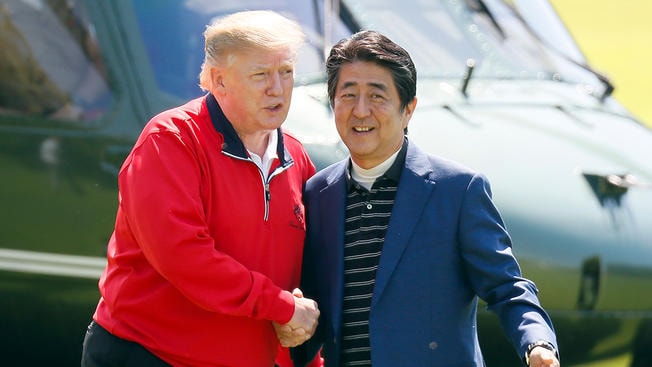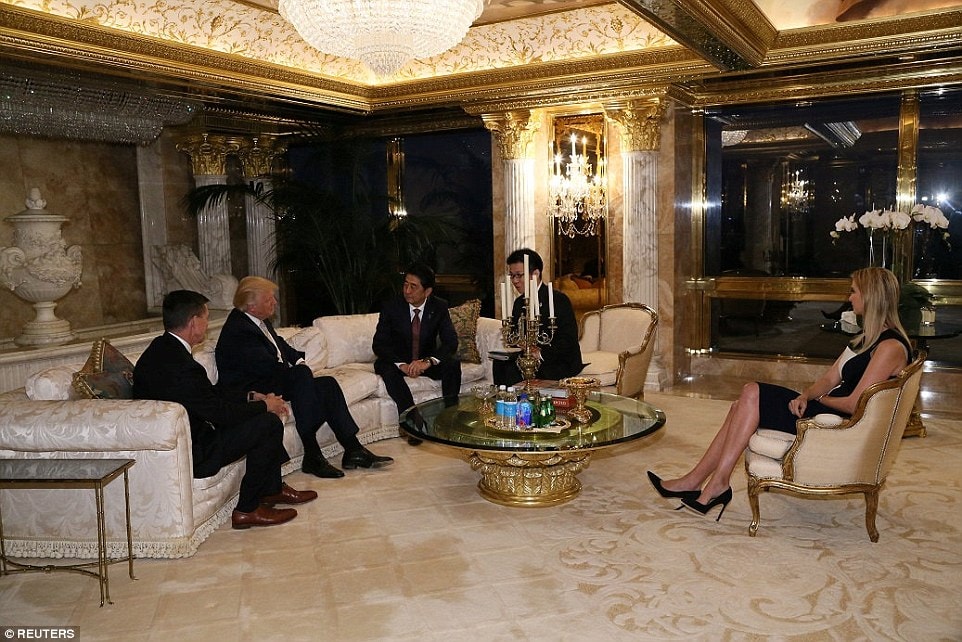US President Donald Trump visits Japan: 'Maximizing' benefits of alliance relations
(Baonghean) - US President Donald Trump is the first state guest to meet with the new Emperor Naruhito since his coronation, opening a new era with the name Reiwa. This is a highly symbolic event of the Japan-US alliance, and also shows how both sides try to "maximize" each other's interests.
Shighly symbolic diplomatic event
For bilateral relations, this diplomatic event is highly symbolic, showing the unwavering commitment of the Japan-US alliance.
Unlike President Trump's foreign trips, what the press pays attention to is not what his agenda is like or what issues he will address, but his "outside the meeting room" schedule.
 |
| US President Donald Trump (left) and Japanese Prime Minister Shinzo Abe play golf in Mobara, south of Tokyo on May 26, 2019. Photo: AP |
It was a busy meeting period for the US leader, including a private round of golf with Japanese Prime Minister Shinzo Abe, attending a sumo tournament and presenting the “Trump Cup” to the champion; a visit to the Izumo-class helicopter carrier; and a private dinner at a barbecue restaurant serving Mr. Trump’s favorite steak.
The working meeting was only scheduled for May 27 after Mr. Trump met with new Japanese Emperor Naruhito.
With more media attention focused on the agenda outside the meeting room, it seems that President Trump's trip is more about friendship than policy.
However, in reality, the way President Trump and Prime Minister Abe "paint" the US-Japan alliance shows that both sides have their own calculations.
Japan asserts its role
Inviting President Trump as the first state guest after the new era in Japan began is a message showing Tokyo's special regard for its alliance with Washington.
This is also in line with Prime Minister Shinzo Abe's long-term strategy in relations with the US: to maintain stability in this relationship, and to seek to avoid conflicts and contradictions with Washington.
In fact, since US President Donald Trump took office with many "aggressive" statements and decisions towards allies, instead of protesting and being dissatisfied, Japanese Prime Minister Shinzo Abe has always sought ways to "shorten the distance" with the US leader.
He was the first foreign leader to meet Mr. Trump immediately after the 2016 presidential election. Since then, they have had 40 conversations, either in person or by phone, to discuss bilateral and international issues of mutual concern.
The two leaders also publicly congratulated each other on their election victories in their respective countries. There are even reports that Prime Minister Abe nominated President Donald Trump for the Nobel Peace Prize…
For Japan, the Prime Minister's handling of the situation is a smart move. No matter what, Japan still needs to rely on the US security umbrella in the region, especially in the context of the unpredictable situation on the Korean peninsula.
Economically, although China has become Japan's largest trading partner, the US remains Tokyo's largest export market. Therefore, the alliance with the US is something Japan cannot afford to lose.
 |
| Prime Minister Shinzo Abe was the first foreign leader to meet Donald Trump immediately after the 2016 presidential election. Photo: Reuters |
However, despite efforts to keep this relationship stable within the framework, the most thorny issue in the US-Japan relationship today is the bilateral trade surplus, which has been a frequent complaint of the US President throughout the past time. Japan is currently facing risks of being caught in a "tax war" with the US.
In 2018, the US decided to impose new import tariffs on aluminum and steel from Japan, the European Union and several other countries. The US also repeatedly threatened to increase import tariffs on cars from Japan.
In addition, negotiations on a trade agreement between Japan and the US are also facing difficulties due to differences in views between the two sides on a number of issues.
Therefore, Prime Minister Abe will take full advantage of his meetings with the US President to promote a mutually beneficial trade agreement.
America seeks a "mediator"
On the US side, President Donald Trump's four-day visit to Japan is not only symbolic but also places Tokyo in a larger role in Washington's Asia strategy.
Relations with China and North Korea, two pillars of President Trump's Asia policy, are at a sensitive stage.
The strategy of applying maximum pressure on trade with Beijing or conciliating dialogue with North Korea has not yet achieved the desired final results of the US administration. Therefore, the US needs the role of its ally Japan - a country that can support Washington both economically and in security.
A trade deal with Japan would help Washington maintain pressure on Beijing, while President Trump may need Japan’s military support on security issues with North Korea.
In addition to North Korea and China, according to observers, the US also needs Japan as a reliable ally and a suitable choice in dealing with Iran.
Currently, tensions between the US and Iran are escalating, even the possibility of military conflict is not ignored, so there is a need for an "envoy" to act as a mediator between the parties.
While US allies in Europe have always appeared to "defend" Tehran, and Gulf countries have long considered Iran an "enemy", finding an external, neutral partner is the appropriate choice.
 |
| President Trump is expected to visit the Izumo-class helicopter carrier, a Japanese weapon that is being improved. Photo: Reuters |
At this time, Japanese Prime Minister Shinzo Abe unexpectedly planned to visit Iran in June. Japan is an ally of the US, but also an important energy partner of Iran.
Most likely, Prime Minister Shinzo Abe will take on the role of ambassador this time to become a bridge of reconciliation and reduce tensions between the US and Iran.
With both sides wanting to “maximize” the benefits that the other brings, President Donald Trump’s visit to Japan this time will certainly not be interrupted by issues that divide the two sides, such as tariff sanctions, sharing the burden of defense spending, etc.
The US’s immediate focus remains on countering China, North Korea and Iran. Meanwhile, Japan is also preparing for the Upper House election in July – an opportunity for Prime Minister Abe’s ruling coalition to consolidate its majority in Parliament.
Therefore, creating a "peaceful atmosphere", mentioning issues of common concern, and avoiding conflicts and disadvantages will probably be the most important goals that the US and Japan aim for in this important diplomatic event./.

